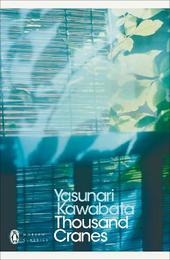
|
Thousand Cranes
Paperback / softback
Main Details
Description
'Thousand Cranes has the qualities of the best Japanese writing- a stunning economy, delicacy of feeling, and a painter's sensitivity to the visible world' Atlantic Kikuji has been invited to a tea ceremony by a mistress of his dead father. He is shocked to find there the mistress's rival and successor, Mrs. Ota, and that the ceremony has been awkwardly arranged for him to meet his potential future bride. But he is most shocked to be drawn into a relationship with Mrs. Ota - a relationship that will bring only suffering and destruction to all of them. Thousand Cranes reflects the tea ceremony's poetic precision with understated, lyrical style and beautiful prose.
Author Biography
Yasunari Kawabata, winner of the 1968 Nobel Prize for Literature, was one of Japan's most distinguished novelists. Born in Osaka in 1899, he published his first stories while he was still in high school. Among his major novels published across the world are Snow Country (1956), Thousand Cranes (1959), The Sound of the Mountain (1972), and Beauty and Sadness (1975). Kawabata was found dead, by his own hand, in 1972. Yasunari Kawabata was born near Osaka in 1899 and was orphaned at the age of two. His first stories were published while he was still in high school and he decided to become a writer. He graduated from Tokyo Imperial University in 1924 and a year later made his first impact on Japanese letters with Izu Dancer. He soon became a leading figure the lyrical school that offered the chief challenge to the proletarian literature of the late 1920s. His writings combine the two forms of the novel and the haiku poems, which within restrictions of a rigid metre achieves a startling beauty by its juxtaposition of opposite and incongruous terms. Snow Country (1956) and Thousand Cranes (1959) brought him international recognition. Kawabata died by his own hand, on April 16 1972.
ReviewsA literary habitat like no other . . . quietly devastating fiction. . . . Behind a lyrical and understated surface, chaotic passions pulse * The Independent (London) * Thousand Cranes has the qualities of the best Japanese writing: a stunning economy, delicacy of feeling, and a painter's sensitivity to the visible world * The Atlantic * A novel of exquisite artistry . . . rich suggestibility . . . and a story that is human, vivid and moving * New York Herald Tribune * Kawabata is a poet of the gentlest shades, of the evanescent, the imperceptible. This is a tragedy in soft focus, but its passions are fierce * Commonweal *
|